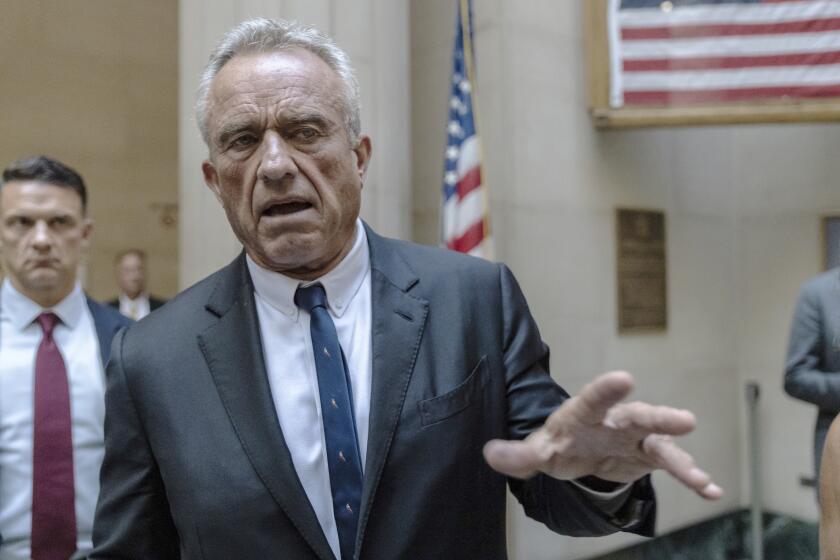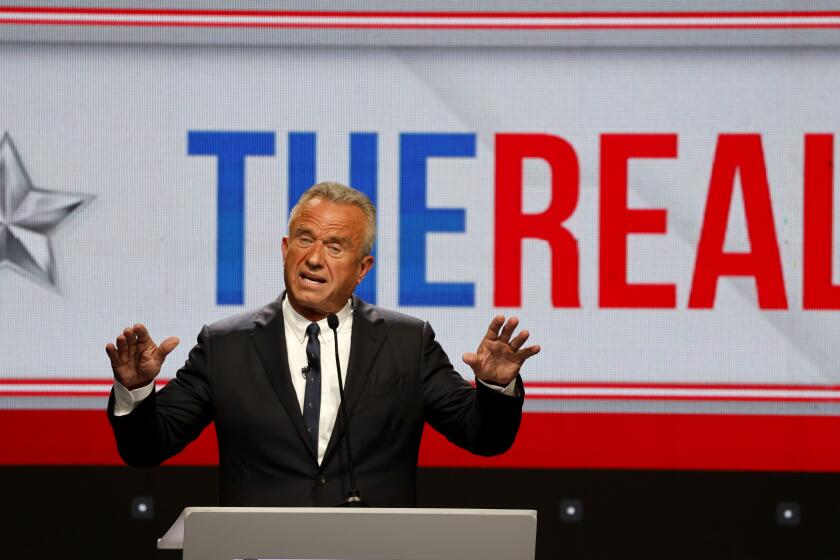Kennedy Jr. suspends his presidential bid, endorses Trump. How will it affect the race?

- Share via
Robert F. Kennedy Jr. announced the suspension of his presidential campaign at a Friday news conference in Phoenix, denouncing the Democratic Party of his storied family and throwing his support behind the Republican nominee, former President Trump.
Hours later, Trump introduced Kennedy at his own rally in Glendale, Ariz., where he asked Kennedy’s supporters to back their new “coalition.”
“We’re leading now, but I think he’s going to have a huge influence on this campaign,” Trump said. “Bobby and I will fight together to defeat the corrupt political establishment and return control of this country to the people.”
“Don’t you want a president that’s going to make America healthy again?” said Kennedy, who is known for his anti-vaccine stances and has campaigned on ending chronic illnesses among children.
The event — where Trump’s crowd roared their applause for Kennedy, chanting, “USA! USA!” — marked an incredible departure from American political norms going back generations, and a stunning break from the Kennedy family legacy.
Trump said Kennedy’s father, the U.S. senator from New York and U.S. attorney general, and uncle President John F. Kennedy Jr. — both staunch Democrats — were “looking down right now” and “very, very proud of Bobby.”
Five of Kennedy’s siblings issued a statement calling his endorsement of Trump a “betrayal” of the family’s values.
Both Trump and Kennedy acknowledged they had criticized each other in the past, and Kennedy said they still don’t agree on everything. But they said they were joining together for the nation.
At his own event earlier in the day, Kennedy said he would work to remove his name from ballots in 10 swing states where he believes he does not have a chance of winning but where his presence on the ballot could affect the outcome in favor of the Democratic ticket led by Vice President Kamala Harris, who has declined to speak with him.
He withdrew from the Arizona ballot Thursday.
He said he would remain on the ballot in other states where the outcome is less in question, and encouraged his supporters to still vote for him there — suggesting an outlandish possibility that an electoral college tie between Trump and Harris could result in him being named president.
At the same time, Kennedy said he was “joining the Trump campaign” after Trump promised, if he wins, to bring him into his administration to combat chronic illness among American children — which Kennedy has long suggested is due to “Big Pharma” and “Big Ag” pumping “toxins” into the nation’s food supply.
“President Trump has told me that he wants this to be his legacy,” Kennedy said. “I’m choosing to believe that this time he will follow through.”
Kennedy also said Trump promised to tackle two of his other top priorities — by immediately ending the war in Ukraine and by confronting political and media “censorship,” which both he and Trump, famous wealthy men with powerful platforms, routinely claim to be victimized by.
Kennedy’s earlier announcement came in a nearly 50-minute, grievance-laden speech in which he claimed he would have won the presidency in a fair race, that national media had become “mouthpieces” for Democrats, and that Harris’ elevation to the top of the Democratic ticket was the result of a “palace coup.”
Robert F. Kennedy Jr. withdrew from the ballot in Arizona late Thursday, a day before he and Donald Trump were set to appear miles apart in the Phoenix area.
The decision promised to have an immediate effect on the tight race between Trump and Harris. Both hoped to benefit — or at least not suffer too much — from the coming realignment of Kennedy’s supporters.
How that shift will play out remains unclear.
A Pew Research Center poll this month suggested that Harris has already picked up some would-be Kennedy supporters. It appeared that backing came in some measure from women and nonwhite voters who previously were leaning toward Kennedy.
But Trump and his allies say the Kennedy endorsement would be a victory for their candidate. “Fox & Friends” host Brian Kilmeade claimed Friday morning that Trump would pick up a critical 2 or 3 percentage points with Kennedy’s support. That would be enough, Kilmeade said, to swing the race back into the GOP’s favor.
Kennedy, a 70-year-old Los Angeles resident, entered the race in April 2023 with a burst of media attention. He showed unusual strength in some early polls for a candidate with no experience in elected office. But his support flagged after Harris emerged last month as the Democrats’ apparent nominee.
Kennedy’s thoughts about leaving the race became public in recent days, when his vice presidential running mate, Nicole Shanahan, discussed those talks. She said Kennedy might accept a position in a Trump administration, in particular if he thought it could help combat what she called an epidemic of chronic disease.
The longtime environmental attorney initially ran as a Democrat. But by October 2023, Kennedy said that he would run as an independent, because party nominating rules made it too difficult to compete, particularly against an incumbent like President Biden.
After his speech Friday, five of his siblings — Kathleen Kennedy Townsend and Courtney, Kerry, Chris and Rory Kennedy — issued a joint statement reaffirming their support for Harris.
“Our brother Bobby’s decision to endorse Trump today is a betrayal of the values that our father and our family hold most dear,” they said. “It is a sad ending to a sad story.”
Kennedy suggested in his own remarks that his endorsement of Trump also may not sit well with others in his family, including his wife, actor Cheryl Hines.
“This decision is agonizing for me because of the difficulties it causes my wife and my children and my friends, but I have the certainty that this is what I’m meant to do, and that certainty gives me internal peace, even in storms,” he said.
He did not say what those “difficulties” were.
Kennedy said his independent status would allow him to break the grip on power held by a virtual “uniparty” — the Democrats and Republicans — and that he would be in a better position to cut out-of-control government spending, to take on “Big Pharma” and other corporate interests and to invest more in reversing America’s epidemic of chronic illness.
Even after his shift to an independent campaign, and as he courted support from smaller political parties, polls showed Kennedy unable to move within reasonable striking distance of his big-party rivals.
The independent candidate struggles for attention as an assassination attempt and Biden’s dramatic exit dominate headlines in the presidential race.
Kennedy argued that he should be allowed into the June debate between Biden and Trump, but he could not persuade the other candidates or networks that he had earned a place on the stage.
Kennedy’s campaign also spent abundant time and money trying to qualify for the ballot in all 50 states. He suffered a setback last week when a New York judge ruled he shouldn’t appear on the ballot in that state because he listed a “sham” address on nominating petitions.
Though he presented himself as a pragmatic problem solver not beholden to big interests, Kennedy’s views on some issues — particularly vaccines — were extreme. A particularly problematic example: when he compared Biden’s vaccine policies to the Holocaust. He suggested that Jews, including Anne Frank, had more freedom under the Nazis than Americans living with COVID-19 mandates.
That drew rebukes from many Jewish groups and even a complaint from Hines, who called the Frank reference “reprehensible and insensitive.” Kennedy apologized.
Though born into what some viewed as an American political “Camelot,” Kennedy struggled as a young man, particularly with his 14-year addiction to heroin. The candidate sought to use that ordeal to his advantage, saying that his 40 years in recovery made him uniquely qualified to bring new solutions to the nation’s addiction crisis.
But other aspects of his past, including his relationships with women, became fodder for new criticism.
That included the revival of a 2013 New York Post story, after the tabloid somehow acquired a journal that RFK Jr. allegedly kept in 2001. It included a log of 37 women whom he had sex with when he was married to Mary Richardson Kennedy, the Post and other outlets reported.
(Kennedy’s wife had killed herself in the year prior to publication of the story, but she had reportedly found the journal at some point.)
Early last month, reports about the disturbing behavior resurfaced in a Vanity Fair profile, in which a former family babysitter described how Kennedy groped her when she was in her early 20s and taking care of Kennedy’s four children with Mary. Text messages revealed that the candidate apologized to the former babysitter after publication of the article, though he told reporters he recalled nothing about the alleged misconduct.
Then, in August, a New Yorker profile revealed an odd Kennedy prank. As a grown man, the man known — like his father — as Bobby once retrieved a dead bear cub from a roadside and deposited the corpse in New York’s Central Park. The carcass provoked a mystery that consumed the city a decade ago.
Kennedy faulted both Biden and Trump as he crisscrossed the country, trying to spark the kind of momentum his father did in the 1968 race for the White House. But he increasingly lashed out at Biden and the Democrats more, infuriated by the challenges they lodged to his ballot petitions.
As recently as Wednesday, the candidate sent messages like a man still in the fray. One came via a video posted on social media, when he invoked Abraham Lincoln and said “we must realign ourselves with the founding spirit of our nation.”
More to Read
Get the L.A. Times Politics newsletter
Deeply reported insights into legislation, politics and policy from Sacramento, Washington and beyond. In your inbox twice per week.
You may occasionally receive promotional content from the Los Angeles Times.














